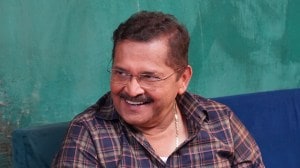Bill Gates at Express Adda: We weren’t born to do jobs… Given AI, how you think about the world won’t be the way to think about it
Microsoft co-founder and philanthropist BILL GATES believes the US will circle back to a more cooperative mode eventually. He speaks on all things AI, climate change and India’s new role in the changing world order.
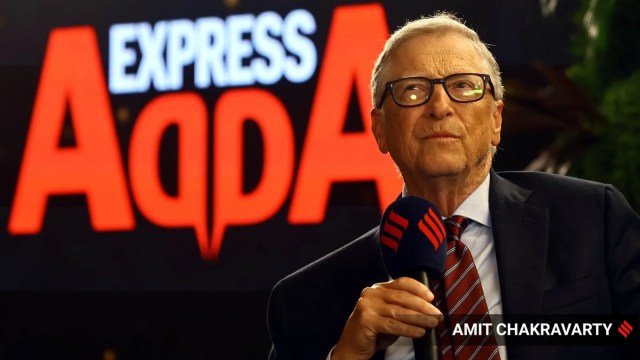 Microsoft co-founder and philanthropist Bill Gates at Express Adda
Microsoft co-founder and philanthropist Bill Gates at Express AddaMicrosoft co-founder and philanthropist BILL GATES believes the US will circle back to a more cooperative mode eventually. He speaks on all things AI, climate change and India’s new role in the changing world order. He was in conversation with ANANT GOENKA, Executive Director, The Indian Express Group, at an Express Adda held in Mumbai
The last time we spoke, we were celebrating global cooperation. You said that’s the reason we were able to defeat COVID. Two years later, that seems very, very difficult to achieve..
We’re going through a little bit of a period where the US is trying to reconsider its role in global cooperation. The US eventually will circle back to a slightly more cooperative mode in terms of what it’s doing. I’d say forcing others to step up for some of these issues in the long run is not a bad thing. My overwhelming feeling is still one of great optimism even though the Ukraine-Russia conflict, the Middle East unrest are creating waves. The resources that should have gone to help the poorest are going into building war material and that’s just a net loss for humanity. We’re going to go through a five-year period, where the actual funds for the poorest countries will be down. But because of accelerated innovation and because I do think this will come back around, I still am very optimistic.
You found a way to suck carbon dioxide out of the atmosphere, to manufacture green cement and to safely produce nuclear energy. Despite all this, we’re going to breach the two-degree temperature increase. How do you remain optimistic about climate change?
We see that in rich countries, deaths from natural disasters go down by 90 per cent because you build things to deal with tornadoes, you build early warning systems and so people get out. So the fundamental goal is that we still have is to grow the economy and accelerate innovation. That will mean that even as climate (change) makes things more difficult, particularly for poor countries near the Equator, the overall human condition is improving. We won’t achieve 1.5 degrees. We’re not even likely to achieve the 2.0 degrees. But there’s no cataclysm at 2.1 or 2.2…You do have a lot of innovation not just in mitigation but also in adaptation, where you can get crops that can deal with the extra heat capacity…So even in climate, because of this pace of innovation, we will stay at a level that should not be disastrous.
What should we be learning from China on green energy?
China’s been able to develop deep research by having very strong universities. And that’s happening in India. In some areas, electronics, batteries, solar generation, China’s out in front. It’s hard to be out in front. It’s actually easier, as India’s coming along to do cheap solar panels here, as you’re doing cheap batteries here, you’ll have the blueprint that they’ve laid out and you’ll be able to match or do better what they do. But they have been pioneers. It’s a real shame for the world that the US-China tension means that the willingness to access those goods is quite limited. So, say electric cars, you know, the tariffs are high enough that there just won’t be many Chinese electric vehicles sold in the United States.
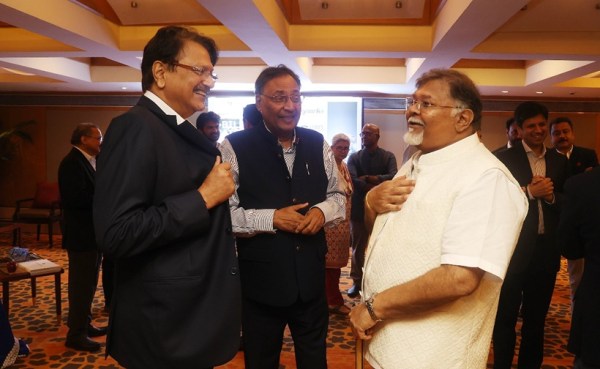 (From right) Viveck Goenka, Chairman and Managing Director, The Indian Express Group with
(From right) Viveck Goenka, Chairman and Managing Director, The Indian Express Group withNiraj Bajaj, Chairman, Bajaj Auto with Ajay Piramal, Chairman, Piramal Group
What do you envision as India’s role in the changing world order, particularly with regard to developing countries?
The best example of India’s role in helping other countries is probably the digital public infrastructure. There are a ton of people in India who did brilliant work. The government, starting with the Prime Minister, supported that work. And it’s a phenomenal thing, whether you look at banking or government benefits being transferred or financial overhead, or a template that allows of start-ups to build services on top of that, insurance and stock trading.
And you name it, every time I’m here, I meet a dozen more companies and I’d say there’s an acceleration. So now India is actually contributing. It’s been true of vaccines since the turn of the century. Serum, Bharat, Bio-E, people that the Gates Foundation has helped to fund and partner with in a pretty deep way, they make over 60 per cent of the world’s vaccines. But we haven’t had that many other examples. Now we’re seeing in diagnostics, in pioneering use of AI, in advanced agriculture, bio-fertilizer, better seeds, animal vaccines, animal genetics. We’re seeing that India is going to be a significant source of innovation that helps solve these problems domestically.
How exactly do the government of India and the Foundation work together? There’s a global trend of scepticism towards foreign foundations. Yours seems to be an exception.
The Indian government has very aggressive goals for reducing childhood death, for agricultural productivity and for improving education. And so the Gates Foundation doesn’t come to India trying to change their goals. We come and say, oh, we think of a cheap Rotavirus vaccine or a pneumococcal vaccine or a $2-TB diagnostic… I think the difference is we’re a deeply technical organisation. I was with the Chief Minister of Maharashtra and in parts of this state, even though this state is incredibly well off, there’s still pockets of malaria. How do we work with this state? Because we’re a very technical organisation and, hopefully, saving children’s lives isn’t controversial. I think people are wary of some foundations that are really trying to be helpful. Maybe that wariness is a little bit higher than it should be.
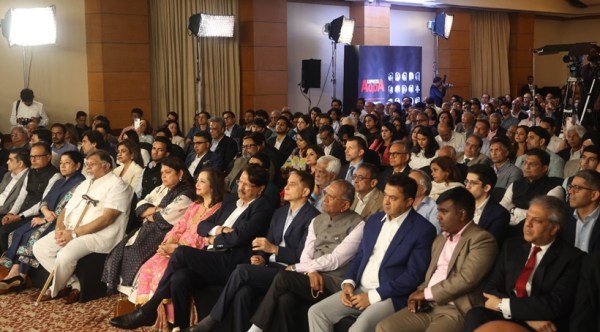 THE POWER ROOM (From left) Nilesh Shah, MD, Kotak Mahindra, Mallika Srinivasan, Chairman & MD, Tractors & Farm Equipment Limited, Viveck Goenka, Chairman and Managing Director, The Indian Express Group, Falguni Nayar, CEO & MD, Nykaa, Swati Piramal, Vice Chairperson, Piramal Enterprises Ltd, Ajay Piramal, Chairman, Piramal Group, Bhushan Gagrani, BMC Commissioner, Govind Laljibhai Dholakia, Founder and Chairman, Shree Ramkrishna Exports Pvt Ltd and MP, Rajya Sabha, Dr Sanjay Mukherjee, Vice Chairperson & MD, MMRDA, P Velrasu, Additional Municipal Commissioner, MCGM Second Row (From right): Jay Kotak, Co-head, Kotak811, Vivek Jain, Managing Director, DWC, Bharat Dhirajlal Shah, Chairman and Independent Director, Exide Industries, Yatin Shah, Co-Founder and Joint CEO, 360 One Wealth, Chhaya Momaya, Director, Pagoda Advisors Pvt Ltd
THE POWER ROOM (From left) Nilesh Shah, MD, Kotak Mahindra, Mallika Srinivasan, Chairman & MD, Tractors & Farm Equipment Limited, Viveck Goenka, Chairman and Managing Director, The Indian Express Group, Falguni Nayar, CEO & MD, Nykaa, Swati Piramal, Vice Chairperson, Piramal Enterprises Ltd, Ajay Piramal, Chairman, Piramal Group, Bhushan Gagrani, BMC Commissioner, Govind Laljibhai Dholakia, Founder and Chairman, Shree Ramkrishna Exports Pvt Ltd and MP, Rajya Sabha, Dr Sanjay Mukherjee, Vice Chairperson & MD, MMRDA, P Velrasu, Additional Municipal Commissioner, MCGM Second Row (From right): Jay Kotak, Co-head, Kotak811, Vivek Jain, Managing Director, DWC, Bharat Dhirajlal Shah, Chairman and Independent Director, Exide Industries, Yatin Shah, Co-Founder and Joint CEO, 360 One Wealth, Chhaya Momaya, Director, Pagoda Advisors Pvt Ltd
One of the things that’s causing uncertainty is AI. How nervous should we be? In this old argument of humanity v/s tech, how is AI going to play out?
This is a deeply, deeply profound advance that, at some point, will change life, all activities, quite a bit. The revolution I was part of was taking computing from being very expensive to being essentially free. You know, when I was young, if I heard there was a computer available at night, I would go, even break in and try to get access. I mean, computers were just so scarce. And now, the idea that your personal computer only gets used a few hours a day, you’re not like, oh, how inefficient.
That is, now what we have is intelligence, which is scarce — brilliant doctors, brilliant engineers, even people to make support phone calls, telesales phone calls. Through AI, we have a lot of work to do on reliability. But AI’s able to solve unbelievably complex problems today. Not all of them, but a lot of them, they’re already superhuman. But because they’re not perfectly reliable, people are hesitating. Where should we apply these things? I think done properly, this stuff is going to roll out in areas like health and education super rapidly over the next couple of years…It’s just software. That intelligence will be free. So you go from a shortage, a shortage of teachers, a shortage of doctors, to having as much doctor expertise as you want, as many brilliant tutors that are customised and personal and encouraging to your motivation.
That’s great. But where will the jobs come from then?
We weren’t born to do jobs. I mean, jobs are an artefact of the shortage that, oh, gosh, somebody better be a farmer or somebody better drive those trucks around. And so it’s very hard to imagine this future because the whole system of markets and pricing and how you go about education, all of that is based on creating the human intelligence to provide a broad range of services. And so as you get away from that being a necessary thing, you get a lot more leisure time, and you get almost a philosophical question of, therefore…
…The sense of purpose?
Yes. It’ll be people who’ve grown up in that world of no shortage who will have to think it through. I think it’s hard for anybody, in my case, to spend 70 years in the world of shortages. It’s hard to reprogramme your brain to this change.
There are half a billion people under the age of 25 in India who want to get educated and will come out looking for jobs and you believe that AI’s not going to come in the way of that?
Society will be able to have a level of output, food, medical advice that won’t require everybody to work like they do today. We’ll have a choice. I mean we can say that the machine shouldn’t help with certain things. We can confine them to certain areas if we choose to. But the reason you think about jobs is because of the shortages. Even that framing of how you think about the world won’t be the way to think about it.
Have you figured out an equation about what the ideal population of the world should be?
The issue of population will not be one of planetary capacity. We will, through innovation, have a population way, way below the maximum planetary capacity. So that’s not the thing that will determine the population. It will be determined by the choices that people make. The clear trend is that the richer a country becomes, the lower its fertility rate. And we have some extreme examples. South Korea has a very low fertility rate. Even in China, there is a decrease every year. Even India’s growth isn’t that large. There are parts of India where you have population shrinkage, more in the south generally, and then in the north. So you do grow. But the growth rate is really, really tiny. The US is kind of a special case because of the level of immigration and it plays a big role. At least the current projection is that the US won’t shrink over the next 50 years.
 (From left) Actor Soha Ali Khan, Radha Goenka, Director, RPG Foundation, Bill Gates
(From left) Actor Soha Ali Khan, Radha Goenka, Director, RPG Foundation, Bill Gates
Is India doing AI right?
I think India’s doing AI correctly, a lot of India’s use of AI will be applying AI. Now the state of the art in terms of these foundational models, so much of it is open source and available and the techniques are so published that even though a lot of that great work is coming out of the US and China, nobody’s really behind.
I mean you can take the latest models and say, I’m going to make sure Indian native languages are supported or, you know, when Indian farmers want to talk about their crops, that the quality of the data and the understanding of the local dialect is really good…So when I talk to people here, although some want to contribute to the foundational pieces, most people see the opportunity to take and apply AI into a particular domain.
Is India’s strategy to chase chip manufacturing correct? As that is the bottom of the AI food chain.
India can be competitive. But it is not worth subsidising a chip industry indefinitely. I just don’t think that’s worthwhile… The US might decide it is (worthwhile) simply because if you need chips for some things and you’re worried that you really angered everyone else so much that they won’t give you their chips, you might have to think that way…The reason India should get into chips is that they’ll be able to be competitive.
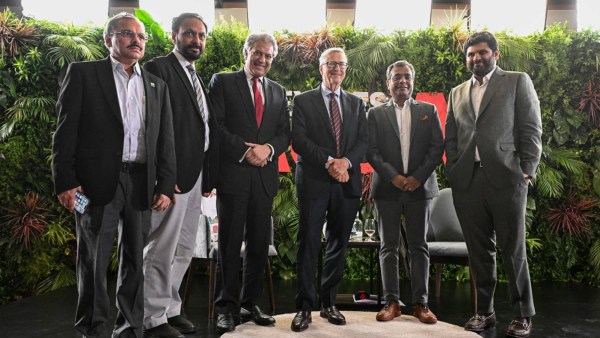 (From left) Dr SSV Ramakumar, Advisor, Greenko; Dr Gurbinder Singh, Registrar, Thapar Institute of Engineering & Technology, Dr Aseem Chauhan, Chancellor, Amity Education Group, Bill Gates, Himanshu Patil, Director, Kesari Tours
(From left) Dr SSV Ramakumar, Advisor, Greenko; Dr Gurbinder Singh, Registrar, Thapar Institute of Engineering & Technology, Dr Aseem Chauhan, Chancellor, Amity Education Group, Bill Gates, Himanshu Patil, Director, Kesari Tours
And where will the electricity come from? We hear that every Chat GPT search takes 10 iPhone batteries of electricity.
The total additional electricity load of all these AI activities could get as high as 10 to 15 per cent of the world’s electricity. So that’s not as much as electric cars, or electric heat pumps will use. It’s a lot of electricity, but (not that much) compared to what India needs to add just for its basic economic growth to achieve its 2047 plan. But, most of these (AI players) are willing to pay a bit of a premium to buy green energy, so I don’t see electrification as a huge setback. Also, there’s an uncertainty… how much electricity we need to run AI systems is very unclear. The amount of electrical power that the human brain uses to do its work is modest. So today our AI models are about 10,000 times less efficient at cognition as the human brain. So evolution has provided an existence proof that there’s a way to do these things without expending so much energy. In the next 10 years, how much of that factor of 10,000 do we reduce? If that goes well, a lot of people who are projecting the gigantic data centres, that won’t be necessary. But it’s hard to say, and nobody wants to be the one who makes that assumption and then ends up without enough data centre capacity to play. Google is about to get to the front of this; so is Microsoft; a lot of companies are racing to lead this next generation.
Knowing fully well that efficiencies will kick in and they might have over capacity.
They might. Most industries, the car industry, after it became popular, it was over capacity. (On) Internet bandwidth, although later we were able to use it, we got an overbuild of those things. In the history of industries that are exploding in their first round of adoption, we generally get over-capacity. That is very typical, but it’s like saying that the market will go down. You don’t know when. Is that over capacity three years from now, 10 years from now, 15 years from now? If your company goes bankrupt because you wait for that, that’s not a good plan.
The efficiency has not come from the old companies. The efficiency operations have come from China.
In general, most innovation comes from existing companies with gigantic R&D budgets. People notice when it’s someone unexpected coming along. But in the history of improving chips, Intel did most of the improvements. Now, when an upstart like Nvidia comes along, or Intel has, to some degree, lost its way, that’s very notable. But if you take innovation as a whole, including the amount that happened inside Google, Microsoft, OpenAI is even better. Now, nobody saw these DeepSeek guys. Even in China, they’re like, ‘who is that guy?’ This is not like some government-funded guy or some mainstream company. Now the Alibaba models are also very good. The ByteDance models are very good. So even within China, DeepSeek is not all that unusual, but they did one very, very clever thing, and they showed everybody the clever thing they did… The speed of innovation and the kind of openness of the innovation. I’ve never seen anything like it.
Must Read
Buzzing Now
Apr 17: Latest News
- 01
- 02
- 03
- 04
- 05












